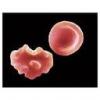Reputation Activity
-
 MJDrew got a reaction from Baby Banker in Changing FFP (with 24hr exp) to thawed FFP with 5 day exp
MJDrew got a reaction from Baby Banker in Changing FFP (with 24hr exp) to thawed FFP with 5 day exp
When I worked in a major trauma hospital a few years back (early 2000s!), we simply started out converting the FFP to thawed plasma at the outset, to prevent issues with forgetting to relabel, confusion over dates, etc, as stated above, in our busy transfusion service. If I were directing the transfusion service there now, I would definitely have made the switch from AB to A as well.
-
 MJDrew got a reaction from jojo808 in Massive transfusion protocol
MJDrew got a reaction from jojo808 in Massive transfusion protocol
Good idea with A plasma!
I still maintain that no one will die from a 5-15 minute wait for thawed plasma. I've been busy lately dishing out statistics on TRALI and other reactions when we have a case with borderline coags and a desire to keep FFP flowing like water. Correcting the numbers is often impossible and attempts to do so can cause a multitude of other problems, the most common being fluid overload. Yes, this can happen even in a trauma patient losing blood by the bucketful. Surgery & anesthesia staff have a unique talent for transfusing folks into cardiac failure to "correct" coag values that won't budge one iota for the duration of the calamity.
BP, I would be really careful with the Factor VIIa before making this part of a trauma protocol. AABB has recently had a couple of articles in its daily mailings (Smart Briefs, I think??) regarding venous thromboses, pulmonary and cerebral emboli in troops in Iraq given Factor VIIa for bleeding, or, scarily, in anticipation of bleeding. Many trauma docs in the US are backing away from the enthusiasm they had about this product when it first was being used for this "off label indication".
-
 MJDrew got a reaction from Dr. Pepper in Blood suppliers
MJDrew got a reaction from Dr. Pepper in Blood suppliers
ALL of the advice here is very good, and I would take ALL of it, most importantly the part about getting to know your regional accounts manager (ARC"ese" for customer representative, customer service rep, etc.). And also that about being very specific with your questions, as per your needs.
One nugget I would add is, as a former ARC customer and ARC medical director (ie, both sides of the coin), I would caution that experience with ARC can vary greatly region by region, as may be the case with any large, national company with multiple, regional stores, centers, etc.
From my time on the hospital end, the reference lab piece was VERY important, as both hospitals where I worked saw a lot of complex patients with crossmatching challenges. It might be a good idea to discuss this piece by conference call with the accounts manager and the IRL (Immunohematology Reference Lab) supervisor, to more specifically address whether your needs and TAT requirements can be met. Due to staffing, demand for services and other issues, IRLs may or may not have on site coverage after hours and weekends, and on call staff would need to be called in for these cases. There is also the possibility of writing a contract with ARC that does not include IRL services if you are not convinced your needs can be met.
BTW, the "inside" slang for a former ARC employee is "FARCE". So there--it's out!
-
 MJDrew got a reaction from tcoyle in childbearing age
MJDrew got a reaction from tcoyle in childbearing age
Our age cutoff for childbearing age is < 50 for the purpose of giving Rh pos trauma blood. We are open to providing Rh pos for a younger female who is bleeding us out if we have limited Rh negs available.
My motto, being Rh neg myself, (and within childbearing age criteria above!), if that I'd rather be immunized than dead from lack of blood!
MJ:cool:
-
 MJDrew got a reaction from amym1586 in Lab Week 2016 (US)
MJDrew got a reaction from amym1586 in Lab Week 2016 (US)
All the best to the hardworking laboratory professionals who do their utmost every day to ensure the quality of results and safety of the patients we help to treat. We in the lab may be "invisible" to most patients, but there is not a diagnostic or treatment decision made without the support of the lab!
And Malcolm is absolutely right--there can NEVER be too much dessert!
-
 MJDrew got a reaction from dragonlady97213 in Lab Week 2016 (US)
MJDrew got a reaction from dragonlady97213 in Lab Week 2016 (US)
All the best to the hardworking laboratory professionals who do their utmost every day to ensure the quality of results and safety of the patients we help to treat. We in the lab may be "invisible" to most patients, but there is not a diagnostic or treatment decision made without the support of the lab!
And Malcolm is absolutely right--there can NEVER be too much dessert!
-
 MJDrew got a reaction from Malcolm Needs in Lab Week 2016 (US)
MJDrew got a reaction from Malcolm Needs in Lab Week 2016 (US)
All the best to the hardworking laboratory professionals who do their utmost every day to ensure the quality of results and safety of the patients we help to treat. We in the lab may be "invisible" to most patients, but there is not a diagnostic or treatment decision made without the support of the lab!
And Malcolm is absolutely right--there can NEVER be too much dessert!
-
 MJDrew got a reaction from Jody in Type A Plasma and standards 5.15.4
MJDrew got a reaction from Jody in Type A Plasma and standards 5.15.4
To me, this would fall under the "urgent medical need" heading. The standard you are referring to indicates only that the blood bank needs to have a policy for transfusing components with "large amounts" of ABO-incompatible plasma, not that such components cannot be transfused. As long as this is a policy approved by the necessary departments in your facility, and signed off by your medical director, and it is followed, my opinion is that this would comply with the intent of the standard.
Another example of invoking urgent medical need (which I had to do on several occasions in a large transfusion service) was to approve the transfusion of platelets >5 days old when there was NO supply of platelets coming in on a specific day, and there was a patient in urgent need. These were signed out in the BB computer system as "urgent medical need", I was called as medical director to approve the release, and we had a policy in place to cover this. As the BB supervisor was heard to say, the platelets didn't all lay down and die at MN on day 5! Never had a recipient reaction with this practice.
-
 MJDrew got a reaction from AMcCord in Type A Plasma and standards 5.15.4
MJDrew got a reaction from AMcCord in Type A Plasma and standards 5.15.4
To me, this would fall under the "urgent medical need" heading. The standard you are referring to indicates only that the blood bank needs to have a policy for transfusing components with "large amounts" of ABO-incompatible plasma, not that such components cannot be transfused. As long as this is a policy approved by the necessary departments in your facility, and signed off by your medical director, and it is followed, my opinion is that this would comply with the intent of the standard.
Another example of invoking urgent medical need (which I had to do on several occasions in a large transfusion service) was to approve the transfusion of platelets >5 days old when there was NO supply of platelets coming in on a specific day, and there was a patient in urgent need. These were signed out in the BB computer system as "urgent medical need", I was called as medical director to approve the release, and we had a policy in place to cover this. As the BB supervisor was heard to say, the platelets didn't all lay down and die at MN on day 5! Never had a recipient reaction with this practice.
-
 MJDrew got a reaction from Malcolm Needs in Type A Plasma and standards 5.15.4
MJDrew got a reaction from Malcolm Needs in Type A Plasma and standards 5.15.4
To me, this would fall under the "urgent medical need" heading. The standard you are referring to indicates only that the blood bank needs to have a policy for transfusing components with "large amounts" of ABO-incompatible plasma, not that such components cannot be transfused. As long as this is a policy approved by the necessary departments in your facility, and signed off by your medical director, and it is followed, my opinion is that this would comply with the intent of the standard.
Another example of invoking urgent medical need (which I had to do on several occasions in a large transfusion service) was to approve the transfusion of platelets >5 days old when there was NO supply of platelets coming in on a specific day, and there was a patient in urgent need. These were signed out in the BB computer system as "urgent medical need", I was called as medical director to approve the release, and we had a policy in place to cover this. As the BB supervisor was heard to say, the platelets didn't all lay down and die at MN on day 5! Never had a recipient reaction with this practice.
-
 MJDrew got a reaction from KatarinaN in Hi, I'm back!
MJDrew got a reaction from KatarinaN in Hi, I'm back!
Greetings, I'm back in the fold again after several years away. Had to get back in the fray once again as being semi-retired now, I found I still need the stimulation of the verbal joust with my peers!
-
 MJDrew got a reaction from mollyredone in Blood suppliers
MJDrew got a reaction from mollyredone in Blood suppliers
ALL of the advice here is very good, and I would take ALL of it, most importantly the part about getting to know your regional accounts manager (ARC"ese" for customer representative, customer service rep, etc.). And also that about being very specific with your questions, as per your needs.
One nugget I would add is, as a former ARC customer and ARC medical director (ie, both sides of the coin), I would caution that experience with ARC can vary greatly region by region, as may be the case with any large, national company with multiple, regional stores, centers, etc.
From my time on the hospital end, the reference lab piece was VERY important, as both hospitals where I worked saw a lot of complex patients with crossmatching challenges. It might be a good idea to discuss this piece by conference call with the accounts manager and the IRL (Immunohematology Reference Lab) supervisor, to more specifically address whether your needs and TAT requirements can be met. Due to staffing, demand for services and other issues, IRLs may or may not have on site coverage after hours and weekends, and on call staff would need to be called in for these cases. There is also the possibility of writing a contract with ARC that does not include IRL services if you are not convinced your needs can be met.
BTW, the "inside" slang for a former ARC employee is "FARCE". So there--it's out!
-
 MJDrew got a reaction from LCoronado in Hi, I'm back!
MJDrew got a reaction from LCoronado in Hi, I'm back!
Greetings, I'm back in the fold again after several years away. Had to get back in the fray once again as being semi-retired now, I found I still need the stimulation of the verbal joust with my peers!
-
 MJDrew got a reaction from tbostock in Hi, I'm back!
MJDrew got a reaction from tbostock in Hi, I'm back!
Greetings, I'm back in the fold again after several years away. Had to get back in the fray once again as being semi-retired now, I found I still need the stimulation of the verbal joust with my peers!
-
 MJDrew got a reaction from John C. Staley in Blood suppliers
MJDrew got a reaction from John C. Staley in Blood suppliers
ALL of the advice here is very good, and I would take ALL of it, most importantly the part about getting to know your regional accounts manager (ARC"ese" for customer representative, customer service rep, etc.). And also that about being very specific with your questions, as per your needs.
One nugget I would add is, as a former ARC customer and ARC medical director (ie, both sides of the coin), I would caution that experience with ARC can vary greatly region by region, as may be the case with any large, national company with multiple, regional stores, centers, etc.
From my time on the hospital end, the reference lab piece was VERY important, as both hospitals where I worked saw a lot of complex patients with crossmatching challenges. It might be a good idea to discuss this piece by conference call with the accounts manager and the IRL (Immunohematology Reference Lab) supervisor, to more specifically address whether your needs and TAT requirements can be met. Due to staffing, demand for services and other issues, IRLs may or may not have on site coverage after hours and weekends, and on call staff would need to be called in for these cases. There is also the possibility of writing a contract with ARC that does not include IRL services if you are not convinced your needs can be met.
BTW, the "inside" slang for a former ARC employee is "FARCE". So there--it's out!
-
 MJDrew got a reaction from amym1586 in Hi, I'm back!
MJDrew got a reaction from amym1586 in Hi, I'm back!
Greetings, I'm back in the fold again after several years away. Had to get back in the fray once again as being semi-retired now, I found I still need the stimulation of the verbal joust with my peers!
-
 MJDrew got a reaction from donellda in Hi, I'm back!
MJDrew got a reaction from donellda in Hi, I'm back!
Greetings, I'm back in the fold again after several years away. Had to get back in the fray once again as being semi-retired now, I found I still need the stimulation of the verbal joust with my peers!
-
 MJDrew got a reaction from Mabel Adams in Hi, I'm back!
MJDrew got a reaction from Mabel Adams in Hi, I'm back!
Greetings, I'm back in the fold again after several years away. Had to get back in the fray once again as being semi-retired now, I found I still need the stimulation of the verbal joust with my peers!
-
 MJDrew got a reaction from Likewine99 in Iron Management in Blood Donors
MJDrew got a reaction from Likewine99 in Iron Management in Blood Donors
The latest AABB News is featuring several articles on low iron in blood donors. The only question I have in light of this is: WHERE HAVE THEY BEEN?? By "they", I mean the AABB, CAP, FDA, and every other agency who regulates our lives in blood banking and supposedly has the best interests of the donors in mind when writing said regulations. The one truly incomprehensible statement, by Dr. Steve Kleinman, indicates that we haven't proven that iron deficiency is clinically harmful. By what metric? How many studies need to be done showing definitive clinical harm? Anyone who has been iron deficient can testify to definite clinical effects from low iron--once it is diagnosed and they are repleted with supplements. "Oh, yeah, is this how a person is supposed to feel? I thought it was normal to be tired all the time, crave ice chips, and have restless legs at night!"
The worst part of this is, to me, that our donors come to us trusting us to have their best interests at heart and assuming we will "do no harm". Yet the blood center has and always has had an inherent conflict of interest in this matter--they need to collect blood to meet patient needs, and pressure is (at least until recently) always on to collect more, even though this may mean donors are walking around at least iron depleted, if not outright deficient. This may be even more the case with younger donors, on which collections centers depend heavily, because, let's face it, they are low hanging fruit.
I have to confess I did not appreciate the scope of the problem until, at my last employer, I started seeing, O neg, male, double RBC donors, who had agreed to do 3 DRBC collections a year, after regularly donating WB every 8 weeks for several years, coming to my attention. It seems that several (at least a half dozen) were unable to do their usual activities after one or more DRBC donations; one particularly memorable story involved a donor having to be carried off the golf course because he became so short of breath that he could not finish 9 holes, walking, which he had been doing for years. When they saw a physician, their hgb was generally <10, and in several cases, <9! All had ferritin levels below 20, which is iron deficient. And, since all were middle aged men, they were all subjected to colonoscopy, as GI bleeding is the leading cause of low hgb in men this age! I was put in the position of telling these donors they needed to take their supplements faithfully as well as take a prolonged break from donation. For this medically sound advice, I was called out by several managers for decreasing the donor base, while I was trying to keep donors safe!
As blood donation is a voluntary activity, we need to be especially cautious of doing no harm. The STRIDE study (Strategies to reduce iron deficiency in blood donors (STRIDE). Transfusion, 2016; epub prior to print) showed that 60% of donors tested were iron deficient AT BASELINE!! Several interventions, including thank you letters, letters with ferritin level and advice to take daily iron if ferritin was low, as well as 2 levels of iron supplementation provided by the center, were performed. Surprisingly, the donors receiving the "low ferritin" letters with advice to take supplements for 8 weeks did nearly as well repleting their iron as the donors actually receiving iron pills from the centers. How hard is this? Yet the story indicates there is reluctance to initiate ferritin testing due to expense! Gee, what other tests have we done for years with little or no proof of efficacy for their stated purpose?
I would welcome add'l input and thoughts on this topic; as you can see, it has been bothering me for some time!
-
 MJDrew got a reaction from Sandy L in Iron Management in Blood Donors
MJDrew got a reaction from Sandy L in Iron Management in Blood Donors
The latest AABB News is featuring several articles on low iron in blood donors. The only question I have in light of this is: WHERE HAVE THEY BEEN?? By "they", I mean the AABB, CAP, FDA, and every other agency who regulates our lives in blood banking and supposedly has the best interests of the donors in mind when writing said regulations. The one truly incomprehensible statement, by Dr. Steve Kleinman, indicates that we haven't proven that iron deficiency is clinically harmful. By what metric? How many studies need to be done showing definitive clinical harm? Anyone who has been iron deficient can testify to definite clinical effects from low iron--once it is diagnosed and they are repleted with supplements. "Oh, yeah, is this how a person is supposed to feel? I thought it was normal to be tired all the time, crave ice chips, and have restless legs at night!"
The worst part of this is, to me, that our donors come to us trusting us to have their best interests at heart and assuming we will "do no harm". Yet the blood center has and always has had an inherent conflict of interest in this matter--they need to collect blood to meet patient needs, and pressure is (at least until recently) always on to collect more, even though this may mean donors are walking around at least iron depleted, if not outright deficient. This may be even more the case with younger donors, on which collections centers depend heavily, because, let's face it, they are low hanging fruit.
I have to confess I did not appreciate the scope of the problem until, at my last employer, I started seeing, O neg, male, double RBC donors, who had agreed to do 3 DRBC collections a year, after regularly donating WB every 8 weeks for several years, coming to my attention. It seems that several (at least a half dozen) were unable to do their usual activities after one or more DRBC donations; one particularly memorable story involved a donor having to be carried off the golf course because he became so short of breath that he could not finish 9 holes, walking, which he had been doing for years. When they saw a physician, their hgb was generally <10, and in several cases, <9! All had ferritin levels below 20, which is iron deficient. And, since all were middle aged men, they were all subjected to colonoscopy, as GI bleeding is the leading cause of low hgb in men this age! I was put in the position of telling these donors they needed to take their supplements faithfully as well as take a prolonged break from donation. For this medically sound advice, I was called out by several managers for decreasing the donor base, while I was trying to keep donors safe!
As blood donation is a voluntary activity, we need to be especially cautious of doing no harm. The STRIDE study (Strategies to reduce iron deficiency in blood donors (STRIDE). Transfusion, 2016; epub prior to print) showed that 60% of donors tested were iron deficient AT BASELINE!! Several interventions, including thank you letters, letters with ferritin level and advice to take daily iron if ferritin was low, as well as 2 levels of iron supplementation provided by the center, were performed. Surprisingly, the donors receiving the "low ferritin" letters with advice to take supplements for 8 weeks did nearly as well repleting their iron as the donors actually receiving iron pills from the centers. How hard is this? Yet the story indicates there is reluctance to initiate ferritin testing due to expense! Gee, what other tests have we done for years with little or no proof of efficacy for their stated purpose?
I would welcome add'l input and thoughts on this topic; as you can see, it has been bothering me for some time!
-
 MJDrew got a reaction from mollyredone in Iron Management in Blood Donors
MJDrew got a reaction from mollyredone in Iron Management in Blood Donors
The latest AABB News is featuring several articles on low iron in blood donors. The only question I have in light of this is: WHERE HAVE THEY BEEN?? By "they", I mean the AABB, CAP, FDA, and every other agency who regulates our lives in blood banking and supposedly has the best interests of the donors in mind when writing said regulations. The one truly incomprehensible statement, by Dr. Steve Kleinman, indicates that we haven't proven that iron deficiency is clinically harmful. By what metric? How many studies need to be done showing definitive clinical harm? Anyone who has been iron deficient can testify to definite clinical effects from low iron--once it is diagnosed and they are repleted with supplements. "Oh, yeah, is this how a person is supposed to feel? I thought it was normal to be tired all the time, crave ice chips, and have restless legs at night!"
The worst part of this is, to me, that our donors come to us trusting us to have their best interests at heart and assuming we will "do no harm". Yet the blood center has and always has had an inherent conflict of interest in this matter--they need to collect blood to meet patient needs, and pressure is (at least until recently) always on to collect more, even though this may mean donors are walking around at least iron depleted, if not outright deficient. This may be even more the case with younger donors, on which collections centers depend heavily, because, let's face it, they are low hanging fruit.
I have to confess I did not appreciate the scope of the problem until, at my last employer, I started seeing, O neg, male, double RBC donors, who had agreed to do 3 DRBC collections a year, after regularly donating WB every 8 weeks for several years, coming to my attention. It seems that several (at least a half dozen) were unable to do their usual activities after one or more DRBC donations; one particularly memorable story involved a donor having to be carried off the golf course because he became so short of breath that he could not finish 9 holes, walking, which he had been doing for years. When they saw a physician, their hgb was generally <10, and in several cases, <9! All had ferritin levels below 20, which is iron deficient. And, since all were middle aged men, they were all subjected to colonoscopy, as GI bleeding is the leading cause of low hgb in men this age! I was put in the position of telling these donors they needed to take their supplements faithfully as well as take a prolonged break from donation. For this medically sound advice, I was called out by several managers for decreasing the donor base, while I was trying to keep donors safe!
As blood donation is a voluntary activity, we need to be especially cautious of doing no harm. The STRIDE study (Strategies to reduce iron deficiency in blood donors (STRIDE). Transfusion, 2016; epub prior to print) showed that 60% of donors tested were iron deficient AT BASELINE!! Several interventions, including thank you letters, letters with ferritin level and advice to take daily iron if ferritin was low, as well as 2 levels of iron supplementation provided by the center, were performed. Surprisingly, the donors receiving the "low ferritin" letters with advice to take supplements for 8 weeks did nearly as well repleting their iron as the donors actually receiving iron pills from the centers. How hard is this? Yet the story indicates there is reluctance to initiate ferritin testing due to expense! Gee, what other tests have we done for years with little or no proof of efficacy for their stated purpose?
I would welcome add'l input and thoughts on this topic; as you can see, it has been bothering me for some time!
-
 MJDrew got a reaction from Malcolm Needs in Hi, I'm back!
MJDrew got a reaction from Malcolm Needs in Hi, I'm back!
Greetings, I'm back in the fold again after several years away. Had to get back in the fray once again as being semi-retired now, I found I still need the stimulation of the verbal joust with my peers!
-
 MJDrew got a reaction from Malcolm Needs in Iron Management in Blood Donors
MJDrew got a reaction from Malcolm Needs in Iron Management in Blood Donors
The latest AABB News is featuring several articles on low iron in blood donors. The only question I have in light of this is: WHERE HAVE THEY BEEN?? By "they", I mean the AABB, CAP, FDA, and every other agency who regulates our lives in blood banking and supposedly has the best interests of the donors in mind when writing said regulations. The one truly incomprehensible statement, by Dr. Steve Kleinman, indicates that we haven't proven that iron deficiency is clinically harmful. By what metric? How many studies need to be done showing definitive clinical harm? Anyone who has been iron deficient can testify to definite clinical effects from low iron--once it is diagnosed and they are repleted with supplements. "Oh, yeah, is this how a person is supposed to feel? I thought it was normal to be tired all the time, crave ice chips, and have restless legs at night!"
The worst part of this is, to me, that our donors come to us trusting us to have their best interests at heart and assuming we will "do no harm". Yet the blood center has and always has had an inherent conflict of interest in this matter--they need to collect blood to meet patient needs, and pressure is (at least until recently) always on to collect more, even though this may mean donors are walking around at least iron depleted, if not outright deficient. This may be even more the case with younger donors, on which collections centers depend heavily, because, let's face it, they are low hanging fruit.
I have to confess I did not appreciate the scope of the problem until, at my last employer, I started seeing, O neg, male, double RBC donors, who had agreed to do 3 DRBC collections a year, after regularly donating WB every 8 weeks for several years, coming to my attention. It seems that several (at least a half dozen) were unable to do their usual activities after one or more DRBC donations; one particularly memorable story involved a donor having to be carried off the golf course because he became so short of breath that he could not finish 9 holes, walking, which he had been doing for years. When they saw a physician, their hgb was generally <10, and in several cases, <9! All had ferritin levels below 20, which is iron deficient. And, since all were middle aged men, they were all subjected to colonoscopy, as GI bleeding is the leading cause of low hgb in men this age! I was put in the position of telling these donors they needed to take their supplements faithfully as well as take a prolonged break from donation. For this medically sound advice, I was called out by several managers for decreasing the donor base, while I was trying to keep donors safe!
As blood donation is a voluntary activity, we need to be especially cautious of doing no harm. The STRIDE study (Strategies to reduce iron deficiency in blood donors (STRIDE). Transfusion, 2016; epub prior to print) showed that 60% of donors tested were iron deficient AT BASELINE!! Several interventions, including thank you letters, letters with ferritin level and advice to take daily iron if ferritin was low, as well as 2 levels of iron supplementation provided by the center, were performed. Surprisingly, the donors receiving the "low ferritin" letters with advice to take supplements for 8 weeks did nearly as well repleting their iron as the donors actually receiving iron pills from the centers. How hard is this? Yet the story indicates there is reluctance to initiate ferritin testing due to expense! Gee, what other tests have we done for years with little or no proof of efficacy for their stated purpose?
I would welcome add'l input and thoughts on this topic; as you can see, it has been bothering me for some time!
-
 MJDrew got a reaction from donellda in FDA reportable or not?
MJDrew got a reaction from donellda in FDA reportable or not?
This is a medical decision, as the units were ordered uncrossmatched, presumably on an emergent basis. Medical decisions are not in the jurisdiction of the FDA in a situation where blood is emergently needed and there is no time to irradiate prior to release, regardless of whether it has been discussed with the attending MD. The key factor in answer 3 is "not discussed AND not emergency release". Technically, there is no difference in purity/potency based on a discussion or no discussion prior to transfusion, regardless of whether there is actually time to irradiate. The risk of TA-GVHD, while there, is miniscule with randomly selected, LR RBCs. If the patient is losing blood that fast, how long do those lymphocytes have in the circulation, anyway?
In my biased opinion, irradiation is a medical decision to begin with and individuals at the FDA who are not in possession of an MD degree have no business ruling on this one way or the other. Since I am not certain as to whether the FDA employee answering the query was an MD or not, I can't assess the validity of their answer, as it pertains only to procedural issues. I am assuming the respondent was not an MD. MJD












